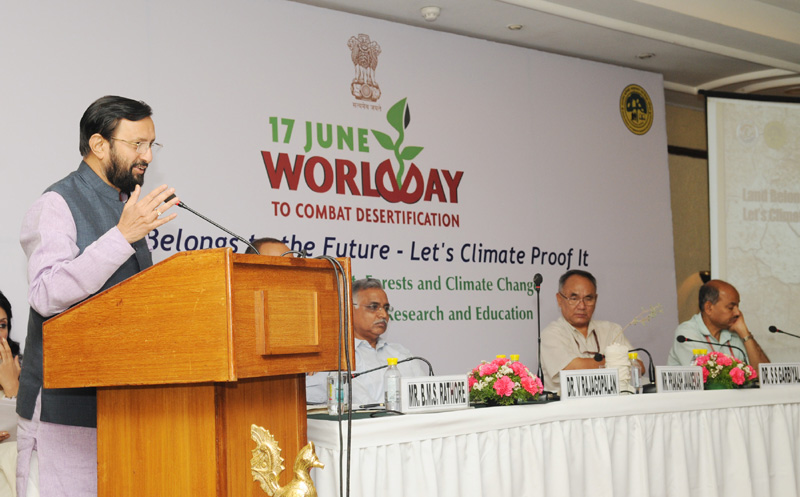
Minister of State for Environment, Forests and Climate Change, Shri Prakash Javadekar has said that India would become “land degradation neutral” by 2030 if all the critical stakeholders i.e. Ministry of Environment, Forests and Climate Change, Ministry of Agriculture, Ministry of Water Resources and Department of Land Resources worked together on a common implementation strategy. To achieve the said goal, it was necessary for all stakeholders to work out a roadmap that addressed the concerns of all. The Minister stated this while addressing the delegates present at the inauguration of a workshop organized by the Ministry of Environment, Forests and Climate Change on the occasion of World Day to Combat Desertification (WDCD) here today.
Elaborating further, the Minister said that desertification, loss of biodiversity along with climate change were the greatest challenges for the sustainable development. The desertification of land could be stopped or reverted through the integrated land use planning on landscape basis. His experience on working 11 watershed projects in Maharashtra showed that land desertification could be stopped with the collective efforts. Coordination among the different stakeholders was the key to achieve the goal of land degradation neutral India. Reclaiming the waste land has direct effect on the poverty eradication and makes communities prosperous, the Minister added.
Shri Javadekar also highlighted the innovative method adopted by the Ministry in publicizing the idea of land degradation neutral India. Earlier, the Ministry invited entries in the form of concept along with painting /designs/ captions on the occasion of World Day to Combat Desertification (WDCD) and has used the best among them to publicize the event. The Minister stated that the crowd sourcing model adopted by the Ministry would give a sense of participation in the people and the Ministry would continue to use this model in all its future endeavours.
A key highlight of the inauguration ceremony was the felicitation of pioneers who addressed the land degradation issue with their innovative approach at the grass roots level. The Minister felicitated Mr. Jadav Payeng from Assam, Mr. Ranaram Bishnoi from Rajasthan and the Foundation for Ecological Security, an organization based in Gujarat for their outstanding contributions in restoring degraded land and ecosystems. The Minister also released a short documentary on SLEM project in India prepared by Indian Council of Forestry Research and Education (ICFRE).
The World Day to Combat Desertification (WDCD) was celebrated every year on 17th June 2014. As a signatory to United Nations Convention to Combat Desertification (UNCCD), which focuses upon Desertification, Land Degradation and Drought (DLDD), India celebrates World Day to Combat Desertification every year since 1995 to promote public awareness of the issue, mobilize international cooperation for the implementation of the UNCCD. The theme of this year`s WDCD is ecosystem-based adaptation with the slogan ‘Land Belongs to the Future, Let’s Climate Proof It’. The 2014 WDCD highlights the benefits of mainstreaming sustainable land management policies and practices into our collective response to climate change.
पर्यावरण, वन तथा जलवायु परिवर्तन राज्य मंत्री श्री प्रकाश जावड़ेकर ने कहा है कि यदि सभी हितधारक – पर्यावरण, वन तथा जलवायु परिवर्तन मंत्रालय, कृषि मंत्रालय, जल संसाधन मंत्रालय तथा भूमि संसाधन विभाग एक साथ मिलकर रणनीति को लागू करे तो 2030 तक भारत भूमि क्षरण तटस्थ देश हो जाएगा। उन्होंने कहा कि इस लक्ष्य को प्राप्त करने के लिए यह आवश्यक है कि सभी हितधारक एक रोड मैप तैयार करे और सभी चिंताओं का निराकरण करें। श्री जावड़ेकर पर्यावरण, वन तथा जलवायु परिवर्तन मंत्रालय द्वारा विश्व मरूस्थलीकरण निराकरण दिवस के मौके पर आयोजित कार्यशाला के उद्घाटन समारोह को संबोधित कर रहे थे।
श्री जावड़ेकर ने कहा कि निरंतर विकास की राह में जलवायु परिवर्तन के साथ-साथ मरूस्थलीकरण तथा जैव-विविधता की हानि सबसे बड़ी चुनौती है। उन्होंने कहा कि जमीन के मरूस्थलीकरण को भूमि के समन्वित इस्तेमाल के जरिए रोका जा सकता है। उन्होंने कहा कि महाराष्ट्र में 11 जलागम(वाटरशेड) परियोजनाओं पर काम करते हुए उन्हें अनुभव में यह दिखा कि जमीन का मरूस्थलीकरण सामूहिक प्रयास से रोका जा सकता है। भारत को भूमि क्षरण तटस्थ बनाने के उद्देश्य को हासिल करने के लिए विभिन्न हितधारकों के बीच तालमेल महत्वपूर्ण है। बंजर भूमि को फिर से हासिल करने से गरीबी उन्मूलन पर प्रत्यक्ष प्रभाव पड़ता है और इससे समुदाय भी समृद्ध होता है।
श्री जावड़ेकर ने भारत को भूमि क्षरण तटस्थ बनाने के विचार के प्रचार-प्रसार में मंत्रालय द्वारा अपनाए गए तरीके पर मुख्य रूप से प्रकाश डाला। इससे पहले मंत्रालय ने विश्व मरूस्थलीकरण निराकरण दिवस के मौके पर अवधारणा रूप में पेंटिंग/डिजाइन/शीर्षक के साथ प्रवृष्टियां आमंत्रित की और इन प्रवृष्टियों में से सर्वेश्रेष्ठ को प्रचार के लिए चुना गया। श्री जावड़ेकर ने कहा कि मंत्रालय द्वारा लोगों को एकत्रित करने के लिए अपनाए गए तरीके से लोगों में भागीदारी की भावना जगेगी और मंत्रालय आगे अपने सभी प्रयासों में इस मॉडल का इस्तेमाल करेगा।
समारोह में उन लोगों का सम्मान किया गया जिन्होंने जमीनी स्तर पर नई सोच और दृष्टि के साथ भूमि क्षरण की समस्या से निपटने का काम किया है। श्री प्रकाश जावड़ेकर ने असम के श्री जादव पेयिंग, राजस्थान के श्री राणाराम बिशनोई तथा गुजरात के संगठन फाउंडेशन फॉर इकोलॉजिकल सेक्यूरिटी को भूमि क्षरण एवं पारिस्थितिकी तंत्र को बहाल करने में महत्वपूर्ण योगदान के लिए सम्मानित किया। पर्यावरण, वन तथा जलवायु परिवर्तन मंत्री ने भारतीय वानिकी अनुसंधान तथा शिक्षा परिषद् द्वारा तैयार भारत में एसएलईएम परियोजना पर एक संक्षिप्त डॉक्यूमेन्ट्री को भी जारी किया।
विश्व मरूस्थलीकरण निराकरण दिवस प्रत्येक वर्ष 17 जून को मनाया जाता है। मरूस्थलीकरण निराकरण संबंध संयुक्त राष्ट्र संघ के समझौते पर हस्ताक्षर करने के नाते भारत 1995 से यह दिवस मनाता है। विश्व मरूस्थलीकरण निराकरण दिवस 1914 का नारा है- जमीन भविष्य की है, इसे जलवायु रोधी बनाएं।